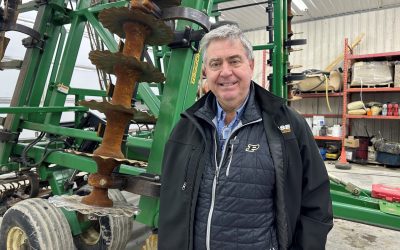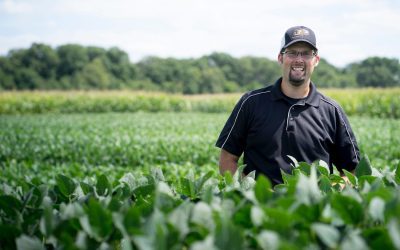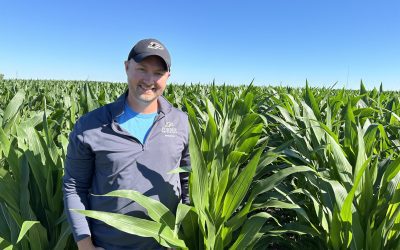Indiana certification brings fifth ‘R’ into nutrient stewardship: Retailers
Posted: October 28, 2022
Category:
ICMC, Indiana Corn and Soybean Post - Winter 2021, ISA
It’s not just the cost of seed and fuel that precision data and planning can save growers. There is a continuing effort of observing the 4Rs in fertilizer application and management: This is the use of the Right source of nutrients at the Right rate and Right time, in the Right place.
As a concept, this has been around for a few decades, but “4R” is a 21st century label that is becoming more recognizable. It is a global reflection of a growing awareness in the general public of the environmental impacts of agriculture, and of farmers’ quest to be good stewards of the land and water they depend upon.
In November 2020, the Agribusiness Council of Indiana (ACI) rolled out its 4R certification program statewide for retailers, after three years of development and the firststage certification of a handful of agribusinesses bold enough to sign up for the pilot audit process. ACI President Amy Cornell explained Ohio was the first state to introduce 4R certification for ag retailers and nutrient service providers, in 2017 – and other states have adopted it.
She noted ACI had the benefit of seeing how the program operates across these different farming geographies before implementing it in the Hoosier State, to learn what works and what doesn’t. It also had benefit of support from The Fertilizer Institute (TFI) of Washington, D.C., and from the Indiana Agriculture Nutrient Alliance (IANA) in developing certification standards.
Over time, Cornell said changing industry trends and the increased emphasis consumers place on sustainability and environmental concerns have changed retailers’ perspective – and she hopes ag businesses that supply seed, fertilizer, advice and other necessities to growers will see the benefit to their own operations participating in the 4R audit and certification process. Certification is also open to professional crop advisors. ACI’s goal now is to get retailers enrolled.
“In the first year, we would be thrilled if we had 15 certified locations,” she added.
Five retailers agreed to take part in pilot certification, said IANA Executive Director Ben Wicker. As part of the program, an audit takes place over a three-year cycle and is performed by an independent third party. It uses 31 standards developed in the 4R steering committee and tailored in accordance with priorities for Indiana water quality based on information from Purdue University and the USDA’s Natural Resources Conservation Service. He said of these, four retailers have already completed Year 1 certification, which means they have met 18 of the 31 standards (the fifth is still auditing). In Year 2, a participant must maintain these and successfully audit 10 more standards; the Year 3 audit adds the final three standards, on top of maintaining the first 28. Then the cycle begins again.
These four retailers are Crop Fertility Specialists in Rossville, Helena in Berne, The Andersons in Waterloo and White River Co-op in Mitchell, Ind.
A multitude of benefits
Wicker and Cornell said the audit process includes education to the retailer, as well as guidance to improve whatever corrective actions the auditor recommends in order to meet or maintain certification. In the first year, Wicker said the 18 standards largely emphasize soil health and yield goals.
This 4R certification began in Ohio, particularly the Western Lake Erie Basin, where ag stakeholders and state agencies were suggesting a managed stewardship program back in 2012 to help reduce harmful algal blooms in waterways. Bloom reduction is still one goal of nutrient management in the Midwest, as well as not adding to waterways that feed into the Gulf of Mexico, where a sizable zone of fertilizer-fed hypoxic water has made news for several years for being detrimental to fish and other marine life. 4R management is beneficial to farmers’ bottom line, as it helps target nutrient use and application and may help them save money and time. As an ag retailer’s customer, “the most direct benefit (of this certification program) is it’s a validation process that the agribusiness you’re working with is following and giving the most comprehensive set of 4R recommendations and following those practices that’s
going to lead to that farmer’s success,” Wicker said. “So, it’s added assurance there.”
Another benefit is the documentation this program requires from the retailers and certified crop advisors to prove they are using best practices in their product offerings and recommendations, both to consumers and potential government regulators.
“We’ve always been able to say ‘trust us, we’re doing the right things’” in response to consumer and food industry demands about responsible stewardship, he noted – but 4R certification is a way to show tangible efforts of the doing.
Early last year, IANA developed a draft of certification – “I think it was one of the last in-person meetings we would’ve had,” Wicker mused, explaining the steering committee had to go to virtual meetings in March because of COVID-19 restrictions. “It actually worked and moved amazingly well” with the 30 members representing retailers, agronomists, farmers, government agencies, ag organizations and conservation groups verbally walking through each standard.
“I consider it a pretty great success story of a really disrupted year,” he said. “We (IANA) think on every farm across Indiana, the 4R principles are foundational to our goals of clean water, healthy soils and viable farms.”
The Indiana Soybean Alliance and Indiana Corn Marketing Council share in these goals. Production and Environment Director Aly Wells said the two organizations were on the steering committee. This is more voluntary work the ag industry can tout among its efforts to be responsible global stewards.
“That’s one reason the steering committee pursued it, was to take a proactive approach,” Wells explained. “So if we can show strong results through this program, that might reduce interest in adding regulations in Indiana.”
In going through certification, retailers and crop advisors will receive the most up-to-date shared scientific standards for best practices associated with the 4R philosophy. From the farmer’s point of view, “it provides assurance that the nutrient service providers that go through the certification will be receiving that information,” Wells said.
“That way, the farmers that work with those providers can know that the person or location that they’re working with is sharing the best information, the best practices, that will retain nutrients on their fields.”
The four retailers that have completed the first year of certification auditing under the pilot program, Cornell said, represent 111,000 acres of serviced ground in Indiana – either having nutrients applied directly through those businesses, or otherwise benefiting from their 4R recommendations. Three new applications have been filed recently, ACI has heard from several more interested applicants and the pilot retailers are talking about certifying additional locations of theirs as well.
In addition to education and audit support for the program, she said ACI is heavily involved in marketing promotion for a member once they are 4R-certified.
Asked about future plans for growth, Cornell noted right now ACI is focused on meeting the current goals set out by program grantors TFI, The Nature Conservancy (TNC) and The Mosaic Co., which all provided funding to get this effort off the ground. In fact, TNC is offering a $300 scholarship to new applicants this year – but there is a limited pool of funding, and it’s going first to those with completed applications.
To learn more about the Indiana 4R certification program, visit www.inagribiz.org/indiana-4r-certification, and to become a member of ACI first, go to inagribiz.memberclicks.net



